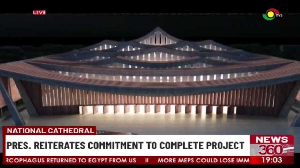
The Commission for Administrative Justice and Human Rights is suggesting that the Board of Trustees of the National Cathedral, which oversaw the $312, 394,049.53 award to Ribade Company Ltd., be the subject of additional inquiry and punishment.
According to CHRAJ, the contract award to Ribade was unlawful since it violated Public Procurement Act 663.
Samuel Okudzeto Ablakwa, the MP for North Tongu, petitioned for the National Cathedral of Ghana to be investigated, which led to their proposal. Among his reliefs were
Investigate the National Cathedral Project's contractor selection, which the petitioner believes was done in violation of public procurement laws and procedures; look into the payment of GHC 2,600,000 and any other payments made to JNS Talent Center Limited from state funds; look into the conflict-of-interest complaint against Rev. Victor Kusi-Boeng, who served as the director of both the National Cathedral and JNS Talent Center Limited in separate capacities; and look into the matter.
The Commission's report, which was signed by Director Joseph Whittal, revealed a number of discrepancies following a year-long examination. According to CHRAJ, the National Cathedral's Board of Trustees gave the contract to Ribade Company Limited without seeking "concurrent approval by the Central Tender Review Committee, a key requirement of the Procurement Act having regards to the contract sum."
Additionally, CHRAJ revealed that the National Cathedral has already accounted for over half of the contract amount.
Our research indicates that as of May 31, 2022, GHS225,962,500.00 (GHS225,950,000.00), which is referred to as seed money, had been disbursed for the building of the National Cathedral, as shown in Exhibit 9.
According to Exhibit 9, this amount of money was spent on consultants, symposia, US fundraising, contractors' mobilization, and site preparation. The amount of money mentioned is not insignificant. According to the paper, "value for money is a requirement of the public interest in project execution."
Since the project is still in the same state, the Commission said it was challenging to assess whether there had been value for the money. Disgruntled Ghanaians and National Democratic Congress members gathered at the Cathedral's location in September to have a swim and soak in what has been called the most costly hole in the world. The structure resembled a swimming pool due to the constant rain that fell at that time.
Members of the project's Board of Trustees resigned as a result of public outcry over the government's position on the National Cathedral's development.